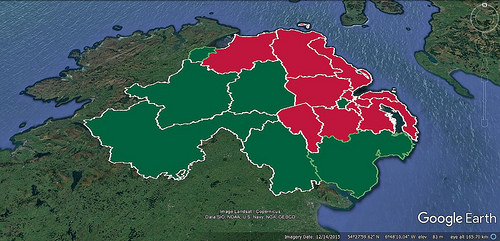The stunning electoral upset delivered by Jeremy Corbyn on the basis of a radical, left platform has had an electrifying impact and is potentially a historic turning point. He has engaged a new generation of youth in politics and smashed the lie that socialist policies are unpopular. In contrast, predictions that the snap general election in Northern Ireland would be ‘the mother of all sectarian headcounts’ were more than borne out and there are real dangers for the working class going forward. Paradoxically, however, the anti-sectarian left is also potentially faced with its greatest opportunity in decades, as Corbyn’s campaign has raised the confidence of many people here that there is an alternative.
DUP & SF sweep the board
After a lacklustre campaign, devoid of any meaningful debate on policy, the DUP and Sinn Féin swept the board on the basis of the highest turnout since 2001, winning ten and seven seats respectively. Only independent Unionist Sylvia Hermon in North Down managed to survive the tide of polarisation. Just as British politics has realigned around two dominant parties based upon class outlook, the same is happening in Northern Ireland based on heightened sectarianism.
Both the DUP and Sinn Féin won their highest ever share of the vote – 36% and 29.4% – and the greatest combined vote share for the two largest parties since 1970. They have further eclipsed their ‘moderate’ rivals, the UUP and SDLP, who are both left without Westminster representation for the first time in their history. Sinn Féin conquered the remaining SDLP strongholds of Foyle and South Down, while Michelle Gildernew won back the sectarian battleground of Fermanagh & South Tyrone from the UUP’s Tom Elliott despite a local Unionist unity agreement. The DUP reclaimed South Antrim from the UUP and Emma Pengelly unseated former SDLP leader Alasdair McDonnell in South Belfast. The long-term decline of the UUP and SDLP has taken a dramatic step forward and both parties will now be contemplating where their future lies.
Sectarianism brought to the fore
In the wake of the Renewable Heating Incentive (RHI) scandal which emerged late last year, the two main parties have successfully shifted focus away from austerity, corruption and lack of progress on LGBT and abortion rights onto the sectarian, divisive issues which benefit them. The previous decade of DUP/SF domination at Stormont had been characterised by growing disillusionment, reflected in consistently falling turnouts at elections. Sinn Féin felt particularly vulnerable in this situation, their implementation of austerity and, especially, their decision to allow the introduction of Tory ‘welfare reform’ having damaged them in their heartlands. Recognising People Before Profit’s breakthroughs in West Belfast and Foyle as a warning, they seized upon an opportunity to reconnect with their base by being seen to stand up to the DUP, collapsing the Stormont institutions, ostensibly over the RHI scandal, and provoking a fresh Assembly election in March.
Sinn Féin loudly proclaimed that they aimed to become the largest party in March and fought a provocative campaign. This played into the DUP’s hands, allowing them to deflect anger over RHI by pointing to a renewed Sinn Féin threat. This sectarian dance polarised society and saw turnout jump almost 10% compared to last year’s Assembly poll, with voters turning out to defeat ‘the other side’. In the end, the DUP retained their position as the largest party by only one seat and 1,200 votes, while Unionism lost its overall majority for the first time in the history of the state.
The psychological impact of this result, combined with Sinn Féin’s triumphalist tone and increased agitation for a border poll, meant that a rallying around the DUP in response was inevitable when Theresa May announced the snap general election. Total Unionist turnout increased by 9.7% compared to March, and the gap between the DUP and Sinn Féin widened to over 53,000. In a matter of months, a new intensity has been injected into the battle for political dominance between the two communities which can find an expression, not just in the ballot box, but on the streets. Controversies around parades, flags and myriad other issues can now take on a more explosive character.
This comes as no surprise. The structures established by the Good Friday Agreement institutionalised sectarianism and pitted the two communities against each other in a tug-of-war. The general direction of travel during the ‘peace process’ has been towards the extremes, with the more hard-line DUP and Sinn Féin first overtaking and now eclipsing the UUP and SDLP. The Orange and Green politicians rely upon sectarian division to maintain their grip on power. When facing challenges from below, particularly of a class character which have the potential to unite workers and young people, they will cynically provoke conflict over the divisive, sectarian issues to whip people back into line. This is precisely what we have seen over the last six months. However, the politicians are not always able to maintain control of the forces they unleash, which can destabilise society and have a detrimental impact on the lives of ordinary people.
Alternative voices squeezed
In this polarised context, smaller parties were generally squeezed. Alliance saw their vote share fall and, despite speculation that Naomi Long could again win East Belfast from the DUP, Gavin Robinson increased his lead over her by 8,000 votes. The Green Party failed to move forward, although it is too early to say whether Stephen Agnew’s willingness to consider a ‘progressive pact’ against Brexit with the nationalist parties has damaged the party amongst Protestants voters and those who want to see a complete break with sectarian politics. Jim Allister’s Traditional Unionist Voice struggled to be heard over Arlene Foster’s battle cry that only she and the DUP could see off Sinn Féin, seeing its vote dwindle further to 0.4%.
Following on from the Assembly election, People Before Profit (PBP) suffered further setbacks. With veteran activist Eamonn McCann standing aside after losing his Stormont seat in March, the party took its lowest ever vote in the constituency in the context of the sharp battle between the SDLP and Sinn Féin for the seat. In West Belfast, Gerry Carroll’s vote fell by 40% compared to the 2015 general election. The party was again subjected to sustained attack from Sinn Féin, including distortions of their correct call for a vote to leave the undemocratic bosses’ EU. Sinn Féin are determined to reassert their dominance in a constituency they regard as theirs by right.
PBP’s mistaken approach
In a sense, PBP are victims of their own success. Their growth has been based upon challenging Sinn Féin and the SDLP from the left, but has also been facilitated by a widespread understanding that they ultimately fall within the ‘Green’ camp on all the divisive issues. This meant they were also able to tap into a perception that Sinn Féin had ‘gone soft’ on the DUP and got too comfortable in coalition. However, this made them particularly vulnerable to challenge by a resurgent Sinn Féin posing as ‘putting manners’ on the DUP.
PBP’s response has been to adopt more nakedly nationalist language, one leaflet declaring Britain ‘a failed state’, the disintegration of which should be welcomed, and hailing the prospect of a border poll. On issue after issue, they have either echoed Sinn Féin’s position or tried to ‘out Green’ them, as on the question of the housing crisis in North Belfast. When PBP were derided as ‘Brits’ by the Sinn Féin election agent in West Belfast, Gerry Carroll asserted their republican credentials – connecting himself to the example of left republican Bernadette McAliskey (née Devlin) – as opposed to calling this attack out for the crass sectarianism that it is.
This approach has failed to stem the loss of votes back to Sinn Féin but will have deepened Protestant suspicion towards the party and its claims that it is ‘neither Orange nor Green’. Their slogans demonstrate a complete lack of sensitivity towards the outlook of Protestant workers and youth – demands for a ’32-county workers’ republic’ and blunt calls for ‘a socialist Ireland’ without explanation will jar with most Protestants looking for an anti-sectarian, left alternative. This is potentially damaging, not just to PBP, but to the prospect of building a cross-community, working class force, feeding into the perception that socialism and nationalism are synonymous. The wider labour and trade union movement must draw lessons from this – of the need to base ourselves firmly on both communities; to take into account the outlook, hopes and fears of both Protestant and Catholic workers; and to advocate compromise on the divisive issues, as well as solidarity and mutual respect.
DUP propping up the Tories
Theresa May’s humiliating failure to win a parliamentary majority has placed the DUP at the centre of UK politics, with the party set to prop up the Tories through a ‘confidence and supply’ agreement. Many in Britain and Northern Ireland are horrified that a party with such homophobic and sexist positions will have influence at the heart of government. This is understandable and they can act as a block on social progress. However, while the DUP leadership are reactionaries, they are also pragmatists. They will not push to roll back LGBT and women’s rights in Britain, or to undermine them further in Northern Ireland, knowing the public would not tolerate it and the Tories could not deliver it. Nor would it be supported by their own voters.
The DUP’s support is primarily based upon being seen as the strongest voice for the Union, not their fundamentalist agenda. For example, a majority of DUP voters support same-sex marriage; 73% support some reform of our archaic abortion laws, while 49% support full decriminalisation! The DUP are not alone in holding a backward position on the issue of reproductive rights – while a majority in both communities support the extension of the 1967 Abortion Act to Northern Ireland, this is not supported by any of the main parties.
Relying on the DUP is obviously far from perfect for the Tories but, given the blow they have just been dealt and with Labour rising in the polls, they will not want a fresh election any time soon. For their part, the DUP do not want to see a Corbyn-led government – both because they oppose his left policies and ebecause of his long-standing connection with Sinn Féin – and will have little interest in rocking the boat. They will likely keep their demands relatively limited: funding for some pet infrastructure projects and for security, as well as other monies so they can claim to have ‘delivered for Northern Ireland’; guarantees there will be no hard border post-Brexit, as ironic as that may seem; and verbal commitments on issues like the extension of the Military Covenant to Northern Ireland.
However, it is an inherently unstable arrangement. The DUP can face opposition from their working class base if they are seen to facilitate ongoing austerity in Northern Ireland and can be pressured to make other demands the Tories simply cannot concede to. For example, elements within the Orange Order are already calling for them to push for the abolition of the Parades Commission. Countless issues and pressures can bring this arrangement crashing down, not least organised working class opposition. The trade union movement must seek to lead a mass movement of workers and young people, including through co-ordinated industrial action, to force this illegitimate and weak Tory government from power.
Sinn Féin’s ‘progressive’ credentials
In response to the DUP’s now central role, there have been renewed calls from some quarters for Sinn Féin to abandon its abstentionist position and take its seats in Westminster, believing this would strengthen the ‘progressive’ forces in Parliament and, potentially, Corbyn. Sinn Féin is not a progressive party, but the other side of the sectarian coin. Like the DUP, their support is derived from being seen as the most strident voice for ‘their community’. They too would use their seats in the House of Commons to inject their divisive, sectarian and nationalist agenda, not to fight for a left government.
Despite their rhetoric, Sinn Féin has ideologically embraced neo-liberalism; dutifully implementing cuts, committing themselves to the project of shrinking the public sector in Northern Ireland and campaigning alongside the DUP for a cut in corporation tax. They are also, as Martin McGuinness put it, an ‘anti-abortion party’ and preside over the ongoing criminalisation of women for exercising control over their own bodies. If a future Corbyn-led government attempted, as he suggested, to extend the 1967 Abortion Act to Northern Ireland over the heads of the Stormont politicians and in line with the wishes of most people here, Sinn Féin would be part of the opposition.
The future of Stormont
Negotiations to re-establish the Stormont institutions are set to recommence now the general election is out of the way, with a formal deadline of 29th June before fresh Assembly elections have to be called, although this is likely to be swept aside like so many others. The DUP’s new role at a UK-level has the potential to further complicate matters. Michelle O’Neill and Sinn Féin will question more vocally whether the British government can now act as a neutral arbiter. Commentators suggest the party is not wedded to restoring devolution, feeling that a period in comfortable opposition could benefit them after a decade implementing austerity.
Given her strengthened mandate, Arlene Foster will not be standing aside as DUP leader until after the RHI inquiry, as Sinn Féin had demanded. There had been indications they were open to moves in the direction of an Irish Language Act but, given their strengthened hand at Westminster, they may feel under less pressure to make concessions now. It is possible no deal will be done in the short-term and a period of direct rule – with the Tories leaning on the other British parties for legitimacy – may be on the cards.
Historic opportunity posed for Labour movement in NI
This election and the contrast between developments in Britain and Northern Ireland must serve as a wake-up call to the labour and trade union movement here. In Britain, the prospect of a left-wing government is now firmly on the agenda in the near future. Meanwhile, sectarianism has strengthened its hold in Northern Ireland. The high turnout here, however, reflected a weary sense of obligation to vote against ‘the other side’, not enthusiasm. All eyes were turned to the battle between Corbyn and May, with socialist ideas being discussed in a way not seen in a generation.
Doubtless, a significant section of people from both communities, especially youth, were hoping for a Corbyn-led government to deliver a break from austerity and a better future for the 99% – this despite Corbyn’s sympathetic attitude towards the IRA campaign, which was only ever capable of entrenching sectarian division, and his equally mistaken ongoing political relationship with Sinn Féin, something the Tories and the media attempted to focus the debate around in a crass and hypocritical way. Unfortunately, there was no genuinely cross-community vehicle for this hope and support to find expression at the polls in Northern Ireland.
Labour voice needed in upcoming elections
Fresh Assembly and Westminster elections are possible within a matter of months and local elections are scheduled for early 2019. Given the enthusiasm for Corbyn’s policies, a window of opportunity is posed to put anti-sectarian, left politics on the agenda unlike any in decades. The Labour Party in Northern Ireland has swelled and shifted to the left under Corbyn’s leadership but is still barred from standing official candidates. A legal challenge to change this is underway but there is no guarantee it will succeed, particularly in the short term. In the event of fresh elections, Labour activists here must make a decisive stand, even if this means defying the London leadership and acting independently. The alternative is to surrender the field to the forces of sectarian reaction.
The Socialist Party worked with others to launch Labour Alternative ahead of last year’s Assembly election, to put the idea of building a mass, cross-community left party on the agenda. Although candidates weren’t fielded in the general election, Labour Alternative has already won the highest left votes in decades in the four constituencies contested, as well as leading a successful campaign against library cuts and taking bold initiatives in fighting for abortion rights. This is only a taste of what would be possible if Labour Party members and trade union activists now threw their weight behind the building of a genuinely anti-sectarian, campaigning left alternative. The labour movement is the only force which has the potential to turn the tide away from sectarian division. In the coming weeks, we will aim to bring together all those who recognise that ‘labour can’t wait’, to put forward the strongest possible anti-sectarian voice for those looking towards Corbyn’s socialist policies in future elections.












